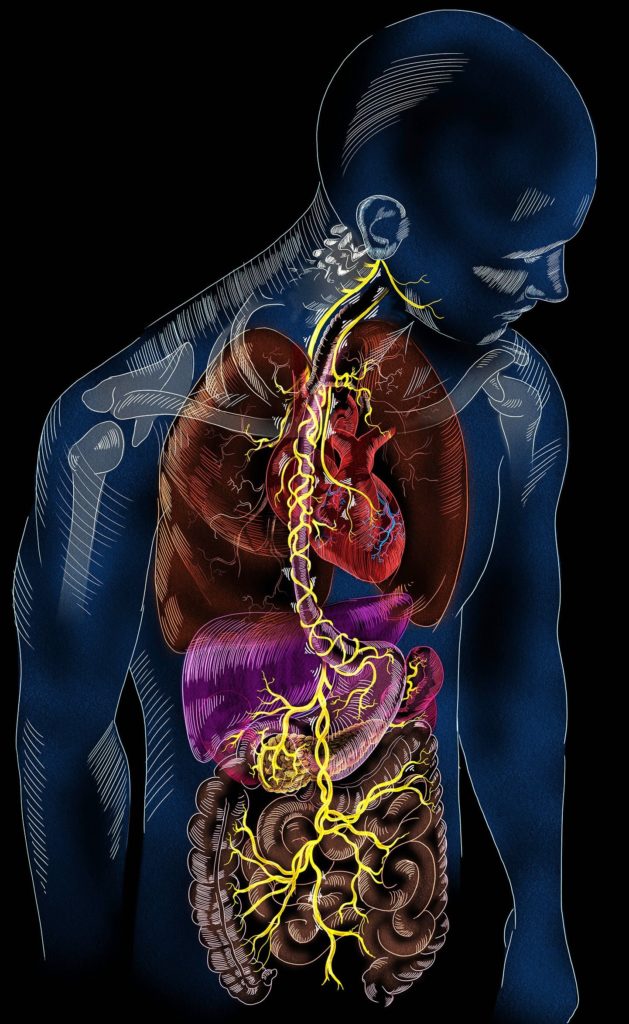Educating and Empowering You to Heal, Thrive, and Live a Happy, Healthy Lifestyle
How to Stimulate Your Vagus Nerve & Strengthen Vagal Tone
 The vagus nerve is the longest nerve in the body. It connects your brain to many important organs including the stomach, intestines, liver, gallbladder, heart and lungs. It’s involved in controlling the immune, endocrine, respiratory and cardiovascular systems.
The vagus nerve is the longest nerve in the body. It connects your brain to many important organs including the stomach, intestines, liver, gallbladder, heart and lungs. It’s involved in controlling the immune, endocrine, respiratory and cardiovascular systems.
The vagus nerve plays an important role in activating parasympathetic tone (calming, rest, digest, relax and repair) branch of the nervous system and turning off the stress, hyper-aroused, fight, flight and freeze sympathetic response. During conditions of rest, the parasympathetic nervous system facilitates digestion, bodily repair, and energy conservation.
As a major nerve of the parasympathetic system, the vagus nerve reflects your body’s ability to regulate inflammation, glucose, gut physiology, and heart rate.
The vagus nerve is a key player in the mind-body connection and the way that your heart responds to emotions, gut instinct, and intuition.
The vagus nerve provides a direct mainline pathway from your brain to your gut. It is also one of the mechanisms by which the stomach and intestines are affected by stress, and functions as the main link between the GI tract and the brain in a relationship known as the brain-gut axis.

Vagal tone reflects the level of parasympathetic activity and your body’s ability to successfully respond to stress, adverse life events, and environmental conditions.
Lower vagal tone is linked to a variety of problems
- Anxiety, depression and mood disorders
- Headaches, migraines
- Poor satiety or inability to relax while eating
- Insomnia, interrupted sleep
- Poor breathing patterns
- Loneliness
- A dysregulated, overactive hypothalamic-pituitary-adrenal (HPA) axis
- Difficulty meditating
- Hypochlorhydria (low stomach acid secretion)
- Gallbladder issues. Low or slow bile acid production making it harder to digest fats and clear toxins
- Dysbiosis, constipation, intestinal bacterial overgrowth
- Poor absorption of nutrients, digestive and GI problems such as IBS
- Hiatal hernia
- Chronic fatigue
- Food sensitivities
- Poor blood flow to kidneys
- Higher blood pressure
- Poor glucose control
- Poor heart rate variability and greater risk of cardiovascular conditions, heart disease and stroke
- High resting heart rate
- Frequent urination
- Cognitive impairment
- Chronic inflammation and greater rates of inflammatory conditions, including all autoimmune diseases (lupus, rheumatoid arthritis, autoimmune thyroid conditions, inflammatory bowel disease and more)
“Studies have shown that patients that suffer with migraine headaches have impaired vagal activity. Depending on the frequency of vagal stimulation, we know it can turn off an asthma attack, an epileptic seizure, a migraine or cluster headache, and it can reduce the perception of acid reflux.” – Stephen Silberstein, MD, a professor of neurology and director of the Headache Center at Philadelphia’s Thomas Jefferson University Hospitals
Low vagal tone is associated with poor emotional and attentional regulation in children and has been conceptualized as a marker of sensitivity to stress in children, adolescents and adults. [J Clin Child Adolesc Psychol.]
Poor vagal tone has been associated with child psychopathology, and anxiety and depression in adults.
Several studies have shown that vagal tone is passed on from mother to child. Mothers who experience anxiety, depression and anger during their pregnancy have lower vagal activity. Once they give birth to their child, the newborn baby also has low vagal tone, and low dopamine and serotonin levels. [Depress Anxiety. 2003 and J Obstet Gynaecol. 2002]
“Decreased vagal function and heart rate variability were shown to be associated with increased fasting glucose and HgA1c levels, increased overnight urinary cortisol, and increased pro-inflammatory cytokines and acute phase proteins.” [Annals of the New York Academy of Sciences. Thayer, J.F. & Steinberg, E., 2006]
The Health Benefits of Higher Vagal Tone
Higher vagal tone is linked to an increased resilience to stress, reduced allostatic load (the amount of stress we accumulate over time), less anxiety, and healthier emotional, physical and psychological well-being.
High vagal tone improves the function of many body systems causing improved digestion (better production of stomach acid and digestive enzymes), less migraines, better blood sugar regulation, reduced risk of stroke and cardiovascular disease, and lower blood pressure.
One of the most interesting roles of the vagus nerve is that it activates the gut microbiome and initiates a response to modulate inflammation based on whether or not it detects pathogenic vs non-pathogenic organisms. [Adv Exp Med Biol. 2014]
Those with higher vagal tone have healthier hearts, less inflammation, stronger social bonds, greater ability to feel calm and peaceful, and tend to exhibit better emotion regulation. [Biological Psychiatry]
Researchers have found a positive connection between high vagal tone, positive thoughts and emotions, and better physical health. The higher and stronger your vagal tone, the more your physical and mental health will improve, and vice versa. [Psychological Science]
People with high vagal tone are not just healthier, they’re also socially and psychologically stronger – better able to concentrate and remember things, happier and less likely to be depressed, more empathetic and more likely to have close friendships.
Vagus Nerve Irritation, Inflammation and Damage
Any kind of GI distress can put pressure on the nerve and irritate it, with a hiatal hernia being a frequent culprit. Chronic stress and anxiety can inflame the nerve. If you’ve had braces or an extensive amount of dental work, you’re at risk for low vagal tone. Even something as simple as poor posture and muscular imbalances can cause the vagus nerve to misfire.
Damage to the vagus nerve can be caused by diabetes, excessive alcohol use, prescription, OTC and recreational drug use, upper respiratory viral infections, botox injections, heavy metal toxicity, or having part of the nerve damaged or severed accidentally during surgery or an operation.
Activation of the vagus nerve influences the stress response, mood, immune function, digestion, and heart rate. Stimulating the vagus nerve has a calming influence on the heart and lungs and calms down the body’s hypothalamus-pituitary-adrenal axis, turning off the stress response and restoring balance to the nervous system.
Strengthening the vagus nerve and increasing vagal tone has been shown to balance the nervous system, improve many brain conditions and health conditions including:
- Anxiety, depression and mood disorders
- Migraines and headaches
- GI problems, digestive ailments, acid reflux, and leaky gut
- Inflammatory bowel disease
- Poor circulation, inflammation, arthritis
- Adrenal insufficiency
- Traumatic brain injury, concussions
- Insomnia
- Eating disorders
- OCD, ADHD
- Post-traumatic stress disorder (PTSD)
- Adverse childhood experiences (ACEs)
- Hypertension, arterial fibrillation (a fib), heart disease
- Addictions including alcohol addiction
- Tinnitus
- Memory loss and dementia
Strengthen Vagal Tone & Stimulate the Vagus Nerve
Think of vagus nerve stimulation as a kind of mental hygiene that requires consistency and regular practice to be most effective.
Reset Your Nervous System with Healthy Vagal Tone
•—Slow rhythmic breathing exercises especially nose breathing with longer exhales. Alternate nostril breathing, and diaphragmatic belly breathing with a deep inhale and a long, slow exhale will stimulate the vagus nerve, slow heart rate, reduce blood pressure and stress hormones.
•—Cold therapy, cold exposure and hydrotherapy (cold water immersion). When done on a consistent basis, cold therapy can lower the sympathetic response and increase parasympathetic activity through the vagus nerve.
Cold therapy how-to: Submerge your body up to your shoulders in a large full immersion tub with ice and water, a cold swimming pool or a cold ice water bath. Splash cold water on your face. Apply a cold washcloth to the face. Go outdoors in cold weather wearing minimal clothing such as shorts and a tank top. End your shower with 60 seconds of cold water.
•—Gargling
•—Singing, humming
•—Sound therapy: Solfeggio frequencies, listening to the sound of running water, a water fountain, waterfall, river, ocean waves
•—Practice yoga, tai chi, qi gong, stretching exercises, Eldoa
•—Grounding, earthing, contact with the ground
•—Exercise
•—Sunshine! Exposure to sunlight. Watch the sunrise and the sunset.
•—Deep, restorative sleep
•—Time restricted feeding (fasting): close up the kitchen and stop eating no later than 7pm (earlier if possible) and do not eat until 7am the next morning
•—Relaxation, mindfulness
•—Gratitude, appreciation, loving, kind, compassionate and forgiving thoughts toward others and yourself
•—Prayer and meditation
•—Laughter
•—Laying or sleeping on your right side
•—Sit down during mealtime; eat in a relaxed state without distractions. Chew food well. The vagus nerve plays a role in appetite and satiation after eating.
•—A healthy, diversified organic diet
•—Maintain a healthy gut and optimize digestion
•—Probiotics
•—Omega-3s
•—Massage, lymphatic massage, gently massaging the neck, self massage of the abdomen and belly
•—Visceral manipulation
•—Neurofeedback, Biofeedback
•—Chiropractic care
•—Craniosacral therapy
•—Acupuncture
•—Social engaging behaviors – hugging a friend or loved one, looking into the eyes of your child, a dear friend, a pet or a loved one with a deep sense of love and connectedness
Related Posts
- Powerful Breathing Techniques
- Natural Remedies for Anxiety and Depression
- Video: Take Any Prescription Drugs? Better watch this!

